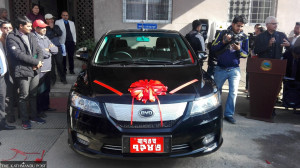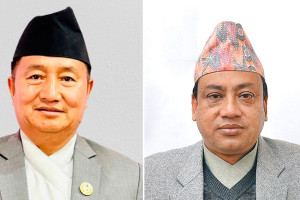Opinion
Revisiting Rautes
The last of the nomads should be allowed to set the pace of integration into Nepali society
Mani Ram Sharma
I was passing through the centre of the district town of Salyan when a schoolgirl ran up to me and spoke breathlessly, “The Raute is here, hurry up!” I ran back to my friend’s house and found a Raute elder named Main Bahadur Shahi sitting on a chair. He smiled at me from across the courtyard and motioned me to step forward. I told him about my desire to study the Raute people and the need to preserve their way of life. They could become dependents of the Nepali state and settle down with sedentary villagers, but they are afraid of attending school. If they were to adopt village life, they would join the poorest, most exploited underclass in Nepali society next to landless labourers like other recently settled hunter-gatherers in South Asia. But unlike marginalised social groups, Rautes are a resilient society.
Nepalis too
Development agencies and the government of Nepal have assigned the nomadic Rautes the dubious status of Disadvantaged Groups (DAGS), lumping them together with women, Dalits and other small ethnic groups. The large government budget has been allocated to empower DAGS. Nepali schools classify Rautes according to the edicts spelled out in the legal code of Nepal. Today, while the constitution of the republic of Nepal states that all people are equal, society continues to classify castes according to the status hierarchy given in the traditional legal code. Although the constitution has done away with social caste status, villagers continue to employ caste and ethnic status as a significant facet of social identity.
Rautes are neither proud nor embarrassed to identify themselves as Nepalis. When asked whether they are Nepalis, they say, “Yes, we are Nepalis too.” But like Surya Narayan Shahi has said, “The president of Nepal is the president of the people of Nepal, the Rautes are the king of the forest.” I take this statement to mean that Rautes want sovereignty over themselves. Let them rule their nomadic forest with freedom and let the government of Nepal control the rest of the country.
This could mean that they are arguing for the existence of multiple, overlapping and flexible identities, and ultimately an identity that prioritises ethnicity over nationalism. Raute identity is styled to keep party politics at a strategic distance from the everyday politics of their lives. I put this question to Raute chief Bir Bahadur Shahi, and he said that whichever party was good for Nepal was good for them. “We don’t reject them, but we don’t vote either. We respect the party that all Nepalis support. If we were in a party, we could say that we are in the party. But it is better to keep quiet as we respect all the parties.”
Raute aspirations
I was stunned, confused and a bit scared. I visited Rautes in the village of Dang two years ago to study their lifestyle, culture and challenges. The recently promulgated constitution states explicitly that the government should provide fundamental needs to all the people. “Rautes are deprived and rejected. Why? This is a violation of the constitution,” he said. As history has repeatedly proved, innovation-driven development is the key to putting global growth back on the right track. Rautes require the government to create innovation-driven development for their meaningful socialisation. Rautes have been with us for all of human history even though they have not always been called by that name.
It is the state’s responsibility to provide education to Rautes, particularly children, and ensure their livelihood in the community. Culture, tradition and customs are also something to be learnt from them. They lack many things. Their own identity should not be abandoned. Rautes are special and must be protected accordingly. The knowledge possessed by Rautes should not go to waste. The irresponsible nature of the political parties who rose to power after the Maoist insurgency must have affected Rautes. It is painful to see the situation of Rautes in the present day when we are talking about modern technology and innovation for social well-being.
Deprived Rautes are now seeking reservation and basic requirements from the government. Empowering nomadic castes like Rautes contributes to the all-round development of the country. So Rautes should be considered at every stage of development. If Rautes fail to see the development of their community, the dream of a prosperous Nepal we have today may not be fulfilled. Development will only come after our policies address the aspiration of Rautes. No matter what Rautes say, they want Nepal to be a developed country; and they are not against our society or the constitution. Rautes disagree with the pace of their integration into the rest of Nepali society through agriculture education, but the state should understand the culture and tradition of Rautes and how they want to adapt to the modern world.
Sharma is a graduate in sociology from Ratna Rajya Laxmi Campus




 24.28°C Kathmandu
24.28°C Kathmandu












